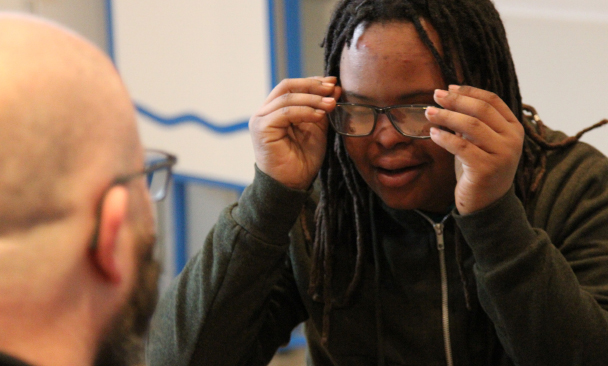Why NHS Funded Eye Tests for Adults With Learning Disabilities Are Long Overdue
31 July 2023
Primary Eyecare welcomes the announcement about the introduction of NHS funded eye tests for children in Special Schools in 2024.

Primary Eyecare, along with the wider eye health sector, welcomes the government’s recent announcement about the introduction of NHS funded eye tests for children in Special Schools in 2024.
We are taking this opportunity to raise the issue of extending equitable care options to adults and young people with learning disabilities – a group, research tells us, who is ten times more likely to develop eye conditions and vision issues than the rest of the population.
Extending Eye Care for Vulnerable Populations
This serious disparity around access to eye care services could potentially lead to undiagnosed visual impairments and adverse consequences affecting general quality of life, given that serious conditions like cataracts, glaucoma, and macular degeneration frequently progress over time.
Denying vulnerable adults NHS funded eye tests adapted for to their specific needs is therefore creating a health inequality ,especially for people facing financial constraints. This is why Primary Eyecare along with Llocal Optical Committees (LOCs) and wider optometry colleagues, is supporting the expansion of a comprehensive eye testing system to adults and young people with learning disabilities, in the same way as testing screening and sight support opportunities planned for children in Special Schools.
The Success of Free Eye Tests for Children in Special Schools
According to research conducted by SeeAbility, there are currently approximately 11,000 children currently being treated in this service – nearly half of whom have never previously undergone any sort of sight test. The service also provides a report to help parents, carers and teachers to better understand what the child can and cannot see, with recommendations for appropriate adjustments in the classroom and at home, including the provision of glasses.
Advocating for Equality
Extending NHS funded eye tests to adults and young people with learning disabilities (also known as the Easy Eye Care Pathway) is a necessary step towards achieving equitable healthcare for all. By addressing this long-overdue issue, early detection and treatment opportunities can be offered to the entire population, fostering independence and a better quality of life for our more vulnerable populations. Consider the case of one of our patients – an elderly man who had been in a wheelchair since early childhood. Because he was in the habit of constantly looking down and never raising his head, he had never had an eye test – but, on being offered one, was prescribed glasses which gave him the confidence to lift up his head and interact with the wider world, significantly improving his quality of life.
Speaking about the current imbalance in service provision, Richard Everitt, Primary Eyecare’s Service Development Director, comments:
‘Having been involved in setting up the NHS Special Schools Eye Care Pathway – an in-school eye examination service for children with learning disabilities in England, I have seen at first-hand the immense benefits that pupils and their families are experiencing. These include individually tailored, timely interventions, access to ongoing appropriate information and support and the pro-active prevention of potential further deterioration of vision.
I cannot stress how important it is to be able to continue to offer this same support as children transition out of special school settings into adulthood and move on through the various different phases of their lives – when it is just as crucial for them to be able to access early detection and treatment opportunities, improved quality of life, enhanced independence and the forestalment of longer term eye and general healthcare complications. Continued lifelong care by qualified eye health practitioners should be considered a basic human right, and an urgent priority for the overall well-being of our more vulnerable populations.
Lifelong Care: A Call to Action
Lifelong care by qualified eye health practitioners is essential to ensure the overall well-being of individuals with learning disabilities, creating a fair and inclusive healthcare system for everyone regardless of their age, mental capacity or socio-economic background.
We encourage all local Integrated Care Boards (ICBs) to put in place the Easy Eye Care service to provide this lifelong care to these patients and support this ambition to reduce health inequalities within their populations.
What Are Learning Disabilities?
A learning disability is not a physical disability. It is defined by the Department of Health and Social Care (DHSC) (2001) as:
A significantly reduced ability to understand new or complex information, to learn new skills (impaired intelligence), with a reduced ability to cope independently (impaired social functioning), which started before adulthood.
A learning disability is different for everyone. The degree of disability can vary greatly, being classified as mild, moderate, severe or profound. In all cases, a learning disability is a lifelong condition and cannot be cured.
A learning disability is different to a learning difficulty, which is a reduced intellectual ability for a specific form of learning and includes conditions such as dyslexia (reading), dyspraxia (affecting physical co-ordination) and attention deficit hyperactivity disorder (ADHD). A person with a learning disability may also have one or more learning difficulties.
Additionally, there are a number of conditions and neurological disorders that often involve or cause some type of learning disability, including Down’s syndrome, autism, meningitis, epilepsy or cerebral palsy.
Further Information
SeeAbility have put together an Easy Read version about what people with learning disabilities can expect when having an eye test – click here.
They have also produced a form for optometrists to complete after an eye tests outlining the results and next steps in a clear, accessible format – click here.